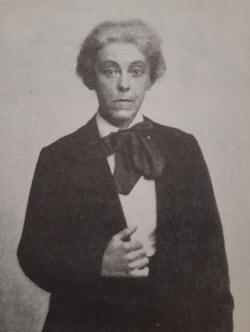

Queer Places:
University College London, Gower St, Kings Cross, London WC1E 6BT, UK
30 Doughty St, Holborn, London WC1N 2AA, UK
9 Gordon St, Kings Cross, London WC1H 0AH, UK
86 Delancey St, London NW1 7SA, UK
Hogarth Studios, 64 Charlotte St, Fitzrovia, London W1T 4QE, UK
Hampstead Cemetery, Fortune Green Rd, West Hampstead, London NW6 1DR, UK
 Charlotte Mary Mew (15 November 1869 – 24 March 1928) was an
English poet, whose work
spans the eras of
Victorian poetry and
Modernism.
Catherine Dawson Giles,
a painter, said, "I will go to the ends of the earth any time to hear
Charlotte Mew tell her poems - she is a modern piper, and I will follow her
piping."
Charlotte Mary Mew (15 November 1869 – 24 March 1928) was an
English poet, whose work
spans the eras of
Victorian poetry and
Modernism.
Catherine Dawson Giles,
a painter, said, "I will go to the ends of the earth any time to hear
Charlotte Mew tell her poems - she is a modern piper, and I will follow her
piping."
She was born in Bloomsbury, London the daughter of Anna Kendall and the architect Frederick Mew, who designed Hampstead town hall,[1][2] The marriage produced seven children. Charlotte, nicknamed Lotti by her family, attended Gower Street School, where she became infatuated with the school's headmistress, Lucy Harrison,[3] and lectures at University College London.[4] Her father died in 1898 without making adequate provision for his family; two of her siblings suffered from mental illness, and were committed to institutions, and three others died in early childhood leaving Charlotte, her mother and her sister, Anne. Charlotte and Anne made a pact never to marry for fear of passing on insanity to their children. (One author calls Charlotte "almost certainly chastely lesbian)".[5] Through most of her adult life, Mew wore masculine attire and kept her hair short, adopting the appearance of a dandy.[6]
In 1894, Mew succeeded in getting a short story published in The Yellow Book,[7] and became a frequent contributor of fiction to the magazine[8] but wrote very little poetry at this time. Her first collection of poetry, The Farmer's Bride, was published in 1916, in chapbook format, by the Poetry Bookshop; in the United States this collection was entitled Saturday Market and published in 1921 by Macmillan. It earned her the admiration of Sydney Cockerell and drew popular respect for her as a poet.[9]
Her poems are varied: some of them (such as 'Madeleine in Church') are passionate discussions of faith and the possibility of belief in God; others are proto-modernist in form and atmosphere ('In Nunhead Cemetery'). Many of her poems are in the form of dramatic monologues, and she often wrote from the point of view of a male persona ('The Farmer's Bride'). Two concern mental illness - "Ken" and "On the Asylum Road". Many of Mew's poems, including "Ken", "The Farmer's Bride", and "Saturday Market" are about outcast figures, expressing Mew's feelings of alienation from the community in which she lives.[10]
Mew gained the patronage of several literary figures, notably Thomas Hardy, who called her the best woman poet of her day, Virginia Woolf, who said she was "very good and interesting and quite unlike anyone else",[11] and Siegfried Sassoon. She obtained a Civil List pension of seventy-five pounds per year with the aid of Cockerell, Hardy, John Masefield and Walter de la Mare.[12] This helped ease her financial difficulties.
After the death of her sister from cancer in 1927, she descended into a deep depression, and was admitted to a nursing home where she eventually committed suicide[13] by drinking Lysol.
Mew is buried in the northern part of Hampstead Cemetery, London NW6.[14]
My published books: